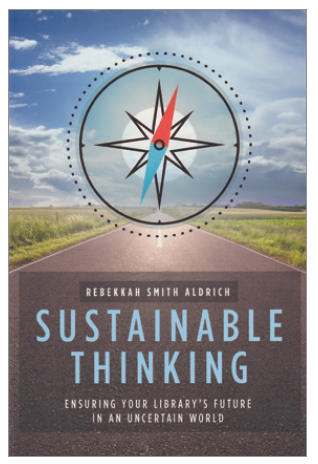 |
By Rebekkah Smith Aldrich. Chicago:ALA, 2018. 194 pp. Paperback: $49.99, ALA members, $44.99. 978-0838916889. bit.ly/SusThink |
When I see the word “sustainable,” the first thing I usually think about is the environment. If that word is paired with “library,” then I start to think about funding, proof of value, a good reputation, and those sorts of things libraries need to survive. When I got a copy of the book Sustainable Thinking: Ensuring Your Library’s Future in an Uncertain World, I wasn’t sure which of my personal definitions it would cover. Happily, it’s both.
Author Rebekkah Smith Aldrich is uniquely positioned to weave both concepts of sustainability together. She is certified as a Leadership in Energy and Environmental Design Accredited Professional (LEED AP)—yes, the same “LEED” that certifies green buildings. When she wrote the book, she was serving as the coordinator for library sustainability at New York’s Mid-Hudson Library System (in August 2018, she stepped into the position of executive director of MHLS). Aldrich’s 20-year job as sustainability coordinator also blended both concepts: While green buildings were a small part of it, she spent most of her time trying to ensure that libraries were sustainable as far as funding. In that capacity, she explains on page 17, she conducted close to 250 focus groups with more than 2,000 people, determining what they think of, and want from, libraries. All of this, along with work on many advocacy/funding campaigns, plus research, informed her book.
I read a lot of library-related books, and I usually skim the Introductions just to get a better sense of the author and the topic. It’s rare for me to get pulled into reading the whole section and to finish with a feeling of, “Hell, yeah!” But it happened here.
I’ll admit that I got riled up in part because the author brings politics into the story. She discusses being “on the front lines of the fight for funding for libraries” (p. xv), something near and dear to my library-marketing heart. Aldrich talks about how hard that fight is, especially today. “What does the world look like when democracy can be bought?” she asks. Then she explains her multifaceted work and the patterns she’s recognized while talking to citizens and advocating for libraries. Near the end of her Introduction, she sets up the book like this:
The world we are living in today has never needed libraries more. Never before has it been so critical that libraries become master tacticians working through a shared strategy that we all need to get behind.
This book is a case for that shared strategy: sustainable thinking.
Sustainable thinking, Aldrich explains, should help us position libraries for future survival and success in the context of their communities. She believes that “libraries are here to make the world a better place” (p. xviii) and that they empower individuals and communities to do the same. “Our power and influence are vast and, in many ways, largely untapped.” I was inspired to learn more and to rejoin the fight.
Then, fully aware of and excited about the book’s purpose, I went back to the Table of Contents to understand how it is organized. Its 25 chapters are grouped into four sections. Part I, Situation Report, is sort of an environmental scan, full of evidence about where the library field stands now. (Spoiler alert: The author is very concerned.) Part II, The Strategy, a 66-page section, shows the “big picture” of whats, whys, and hows. Part III, The Tactics, talks a lot about C-suite topics such as strong leadership and organizational culture. Finally, Part IV is 15 pages of resources, including resolutions on the importance of sustainable libraries and sample “smart climate” pledges. The book ends, aptly, with an example of a long-range plan from a library in British Columbia.
One word I noticed often throughout the book is “tough.” Long-term sustainability is not an easy topic, and Aldrich is not afraid to say what needs to be said to urge action. As just one example, on page 26, she discusses climate change, insisting that libraries should do more to tackle it by leading the way with solar panels, offering information and community discussions, etc. Of course, many librarians bristle at the thought, afraid of triggering anger or pushback from vocal climate deniers. The author confronts those fears head-on: “If you think this topic might be controversial either in your library’s governance structure or among climate skeptics in your community—tough. You have a duty as an educator, as a community leader, to find a way to talk about it … that results in action.” She advises readers to discuss health concerns, the importance of clean water, etc.—things that everyone agrees on. Say whatever works for your community, but don’t sit idly by and do nothing.
I encourage all of you to read this book for yourselves. If your library doesn’t have a copy, buy it. If you own it but thought that only your administrators should read it, grab that copy yourself. But don’t stop at reading—discuss it internally and externally. Shout about it! If you want your library to have a future, then it’s your duty to take this book’s advice to heart, ASAP. |